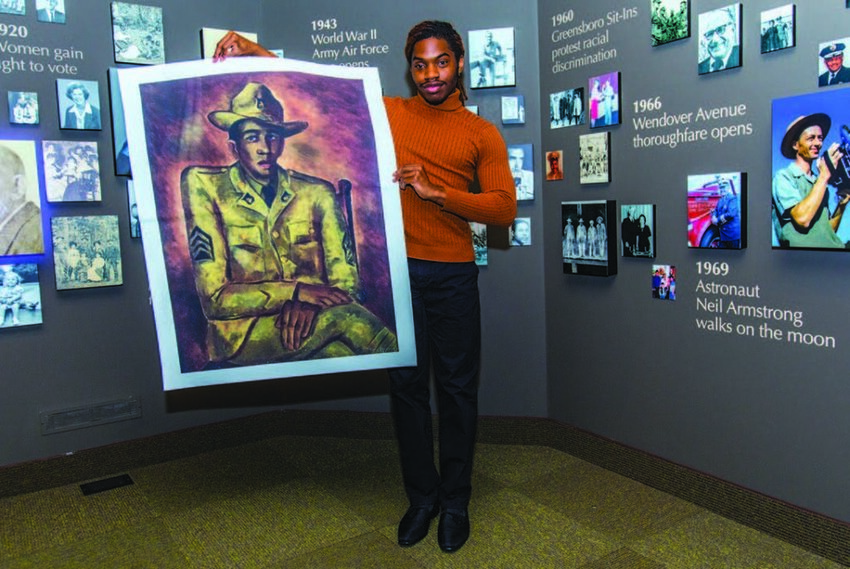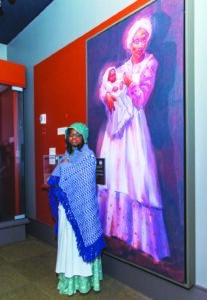 Dominic Walker as an historical interpreter of Melvin Johnson holds a Malvin Johnson self-portrait. Photo by Ivan Saul Cutler/Carolina Peacemaker.
Dominic Walker as an historical interpreter of Melvin Johnson holds a Malvin Johnson self-portrait. Photo by Ivan Saul Cutler/Carolina Peacemaker.Juneteenth preparations are underway. Following a Black History Month panel discussion on holidays celebrated in the African American community, the Juneteenth GSO Collective shared details of this year’s 4-day celebration. The discussion took place on Saturday at the Greensboro History Museum.
 Imani Badiabo as Ede Caldwell. Photo by Ivan Saul Cutler/Carolina Peacemaker.
Imani Badiabo as Ede Caldwell. Photo by Ivan Saul Cutler/Carolina Peacemaker.“Why couldn’t we have a street for our children named for someone who did so much for our community, like Dr. Martin Luther King Jr.,” said Alston.
But years before Dr. King could make his mark on the world, enslaved Americans were waiting to first be freed from the plantation.
Watch Night Service is a cultural tradition steeped in religion. The first Watch Night services took place on “Freedom’s Eve,” or the eve of January 1, 1863. On that night, enslaved and free African Americans gathered in churches and private homes across the country awaiting news that the Emancipation Proclamation had taken effect.
Observed on New Year’s Eve, Watch Night hasn’t changed much in present day. It is still used as a tool to invite the church’s congregation to gather and hear scripture to inspire and encourage them for the new year.
The daughter of a preacher and a Juneteenth GSO Collective Executive Committee member, Princess Johnson said she sees the community moving away from those traditions.
“The church has always been an important place for the Black community. It is a safe space. It gave people homes and jobs and places to meet when they needed it. It is about fellowship and community,” said Johnson.
Kwanzaa, however, is an annual celebration not tied to religion. Instead, it is tied to seven African principles that teach about family, community and unity.
“Kwanzaa is not a religious institution,” said Dawn Hicks-Tefari, co-founder of the Greensboro Kwanzaa Collective. “You celebrate your faith, and then you celebrate your culture.”
She added, “The seven principles are foundational. Not just something we need to celebrate seven days out of the year. That’s the time of reflection of how you have lived those principles throughout the year.”
Even though the Emancipation Proclamation was made effective in 1863, it became clear that not everyone would be free, particularly those living in Confederate states. Freedom finally came on June 19, 1865, when some 2,000 Union troops arrived in Galveston Bay, Texas to deliver the news of the passed legislation. This day came to be known as “Juneteenth,” by the newly freed people in Texas.
“As we do this work on national holidays, this is our collective history. Black History happens every day,” said April Parker, Juneteenth GSO Collective executive member.
This year’s Juneteenth celebrations will be June 16 – June 19, consisting of multiple events. On Friday, a rap and theatre event in downtown Greensboro starts the weekend off, followed by Royal Expressions Contemporary Ballet hosting the Arts Legacy Awards, honoring dancers and artist of various genres and will include dance performances. Uptown Greensboro will host two events this year, its second annual Sneakerball on Saturday, a Black-tie arts and culture event featuring artwork displays, music and poetry performances and awards given for the best sneakers, and an arts and crafts festival on June 19.
The Juneteenth Black Food Truck Festival will be in Center City Park this year, where vendors and Black owned food trucks will be set up, alongside poetry and musical performances. The weekend will culminate in a gospel fest that will feature musicians, choirs, artists, and poets performing pieces that connect religion to the spiritual.
Parker noted that the Black Food Truck Festival was an intentional component of the Juneteenth celebration.
“It was important to add the Black economic focus to this event. Especially coming from the pandemic where Black businesses were overwhelming impacted,” she said.
2023 will mark the Juneteenth GSO Collective’s third year planning this citywide, multi-day cultural arts festival.
Before the panel discussion, the Greensboro History Museum welcomed the public to tour the museum, featuring costumed interpreters to share African American stories from the Gate City.
At “Lifted Voices, Black History,” the interpreters portrayed several important history-makers: Ede, who tried to escape slavery to be with her child; Dr. Frances Jones Bonner, daughter of Bennett College for Women President Dr. David Dallas Jones and led a successful protest and boycott of the movie theaters in downtown Greensboro, in December 1937; Otis Hairston Jr., a photographer who captured celebrities and day-to-day life in Greensboro from the 1970s to the early 2000s; Dr. Charlotte Hawkins Brown, an educator who organized an elite prep school for Black students in Guilford County; Harmon Unthank, a civic leader who made a self-sufficient community for newly freed slaves in Warnersville; Andrew Johnson, a Tuskegee Airman in WWII and former ROTC instructor at Dudley High School; Dr. Alfreda Webb, first Black woman licensed to practice veterinary medicine in the United States and was a professor of biology and animal science at N.C. A&T State University; Dr. Willa B. Player, former Bennett College President and the first Black woman appointed to lead an accredited, four-year college, and Dr. George Simkins, a Greensboro dentist who led multiple lawsuits against the city to desegregate public facilities, including the hospitals and golf courses; and Malvin Johnson, prolific Greensboro artist, nationally recognized for his paintings.